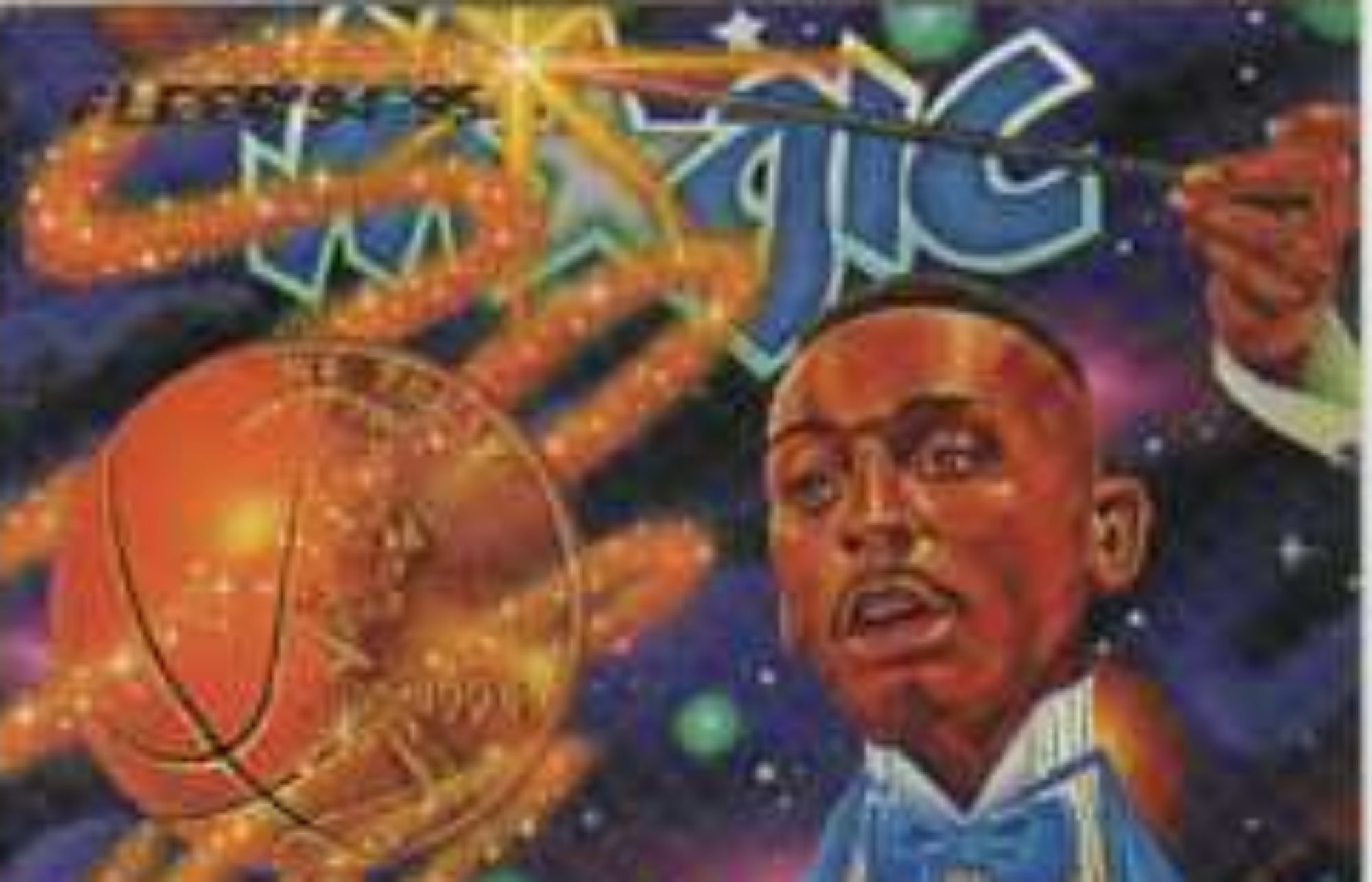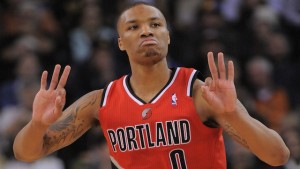Comparing Warriors-Thunder to Lakers-Kings
It’s hard to tell when players are nervous, but clearly most players play better when their team is ahead or has the momentum. Curry and Draymond Green seemed to be spending most of this series trying to recapture the confidence they had in the regular season, and, largely because Thompson kept hitting so many incredible shots, they eventually did. And at that point the pendulum swung and the Thunder lost their confidence.
Can Damian Lillard play defense?
Basketball in 2016
A combination of little else tangible in my life and the fact that I am actually really getting into this season and watching a fair amount of basketball after early apathy has brought me back to the Shawn Kemp Redemption.
Like the prolific child bearer this site is named after, I will try to be fertile in my posts, writing hopefully each day about the lay of the land in the NBA.
Here are some questions this site will attempt to answer in the coming days, weeks, months:
1. What happened to Andrew Bynum?
2. Can anyone disprove that the Golden State Warriors are the most aesthetically pleasing team ever?
3. Who will finish 3rd in the NBA’s Eastern Conference?
4. What have I learned from attending several Los Angeles Clipper games?
5. Is the league moving away from tattoos?
6. Besides Rudy Gay, who are the players we now self-satisfyingly know are actually not good at basketball due to advances in quantitative evaluations?
7. Can Scott Skiles save Brandon Jennings?
8. Why were the Atlanta Hawks so much better last year than this year?
9. Why is Portland so much better than we thought?
10. Who is the coach of the Phoenix Suns?
Please join me on this journey.
party like it’s 2012
Children aren’t appropriate
The Riley Curry “controversy,” in which beautiful Steph Curry’s beautiful 2-year-old daughter enters the podium with him at the obligatory post-game press conference of game 1 of the Warriors more or less beautiful win over the Rockets did expose the lightweight nature of basketball writing and, thus, offend the egos of basketball writers.
Imagine trying to ask questions to a city attorney or elected official at a press conference and they were holding up a 2-year-old and giggling every time the 2 year-old giggled or did something cute
Or just imagine needing to ask somebody a series of serious questions like I, don’t know, your boss or a certified financial planner like [Isaacjon] and they basically made you feel like a silly distraction because they were playing with their 2-year-old.
But for all the good analysis writing about basketball in Grantland and Deadspin and surely other websites and newspapers, there’s a definite lack of intelligent questions at such press conferences, to the point where the parading of children onto the stage seems like a deserved punishment for decades of ineptitude.
In Chicago, I often attended Rahm Emanuel and related local govt. official press conferences and while the answers were not always illuminating, a bunch of the questions demonstrated both a ton of knowledge about what they were asking about and the journalistic skill of distilling that knowledge into a pointed, single question.
To give one example, there was a city of Chicago ordinance passed about a year ago regulating petroleum coke on the far Southeast Side. Emanuel trumpeted this as a big win for the city’s environmental program, but neighborhood organizations opposed the deal as inadequate. So a reporter asked a question to the effect of, “Why couldn’t you get the pollution reduction these groups wanted, and does that suggest your ordinance isn’t strong enough to reduce the health hazard from petcoke?”
So Emanuel could be a dick and not really address the person’s question and just generally talk about his ordinance and environmental agenda (which, I think, in this case he did) or he could say something relatively more candid like, “Well, my city environmental officer said x, y and z about it” or “the local alderman has been working with the community groups – we did all we could to address their concerns” or maybe even directly answer the question, “Look, neighborhood groups are always going to say something is not enough. It’s their whole publicity strategy. The air is bad in this neighborhood but it will be less bad now and there will be a reduced chance of respiratory illness.”
The point is that the question of Emanuel forced him to deliver an on-the-record response. It provides a resource for everyone – from citizens of Calumet in Chicago, to environmental reporters across the country, to the mayor’s political opponents- of what he publicly said about this important health issue when directly asked about it. At the very least, it is a real part of a journalist’s job: it answers an obvious question readers would have in the story this reporter is producing/writing.
But there seems nothing serious or real about these post-game NBA playoff press conferences. I’ve watched these on and off over the years – and seen a share in the last couple of weeks after particularly exciting games like the Rockets game 6 win over the Clippers. The questions never meet even the basic goal of non-sports journalism: To get a public figure to say something on the record – however canned and unrevealing – about a topic of import or interest (since there’s admittedly nothing “important” about who wins most basketball games, the goal seems, then, to get something on the record of interest to basketball fans.)
To use the Rockets-Clippers example, that was one of the most exciting games I’ve watched in my 26 years watching basketball games. The Clippers were up by 19 points near the end of the third quarter in a game that, if they won, would have brought the franchise – the most cursed in basketball history – to the conference finals for the first time ever. Everything was going right for the Clippers and everything was going wrong for the Rockets – it was repeat of the other two Clipper home games in the series where an early close game quickly turned into a total one-sided blowout by the Clippers. The game seemed basically over – the TV announcers waxed poetic about the history of the Cllipers franchise, naming members of the 1970s Buffalo Braves.
Then everything started going right for the Rockets and everything started going wrong for the Clippers, and it was so dramatic and unexpected that it took a while to grasp what was happening. Players for the Rockets that had been playing poorly like the much-maligned Josh Smith were suddenly forces. Great players for the Clippers like Chris Paul and Blake Griffin were suddenly passive and tense and ineffective.
The Rockets ended up winning by 12 points. It was adrenaline-pumping just watching this game. As I fan I wanted to consume even more of it and so I watched the post-game press conference.
there were obvious questions to ask, for the Clippers coach and players
– Why did you lose control of the game?
– You were killing the Rockets with screens that simply let one of your guards drive to the rim because Jason Terry is 104-years-old and was never a sound defender to begin with and keeps losing his man on the pick-and-roll. Why did you go away from that?
– What were you thinking when they got close? What were you thinking when they took the lead?
– How will you possibly mentally recover for Game 7?
– Were you thinking about the cursed history of the franchise at all when this was happening?
So there were basically two types of questions of interest – xs and os questions relevant to the growing legion of basketball wonks about in-game adjustments and strategies. And the kind of emotional psyche questions that might humanize the performers in this competition.
These questions were sort of asked at the press conference, but not directly. There was just a lot of, “Talk about what was happening at the start of the 4th quarter” – questions where the reporter is afraid to confront his subject. It might not sound that different from, “What were you feeling when they cut the lead from 19 to 6 and Josh Smith of all people hit two three-pointers?” But it is, because “talk about” questions are the sign the reporter is just going through the motions and afraid of offending his interview subject who, perhaps not coincidentally, is physically much larger and financially and socially much more powerful than he (and occasionally she) is.
The normal press conference question is not a question, but a proverbial two ships passing at night situation in which the reporter nervously summarizes a certain moment in the game, or in certain unintentionally comedic moments summarizes a whole series of plays, and then the coach or player responds by effectively re-summarizing the already poor summation of the reporter and then adding platitudes about the opposition’s competitive spirit
Reporter: Coach, you made a run there in the 4th….Smith hit a couple of three-pointers and then Johnson made a transition basket…The momentum seemed to shift…Then they called a timeout and seemed to get back into their game…Williams made a couple of players for them….Talk about that part of the game (trails off)
Coach: Well, they’re a real competitive team and Coach Smith, he’s a real competitor. And we were just trying to get back in the game – do what we did to get this far. And unfortunately, after the timeout, they made some shots, but, you know, that’s how this works. It’s a real dog fight in the playoffs.
By asking such indirect questions, that are hardly questions and soft shoeing the whole process, basically by being so evidently unprepared and uncertain of themselves, the reporters allow the coach and players to slip into clichés.
Brian Windhorst, the very good reporter who has made the Riley Curry “controversy” a quasi-internet sensation by pointing out the unprofessional nature of all basketball players who bring their kids to the podium, would certainly contest this characterization of the reporters.
But that’s what I’ve seen even good and nationally recognized reporters like Windhorst are tepid in front of the famous people they write about.
Windhorst, for example, makes good points about how LeBron James – while Cleveland is kicking butt right now – is initiating too many bull-headed isolation plays and occasionally it can really cost the Cavs, like when Atlanta made a late run at the end of the 4th quarter of game 1.
But does Windhorst have the clarity and courage to respectfully ask James about this at the post-game presser, something like, “There are several isolation plays for you in the 4th quarter that ended ball movement for your team and didn’t result in baskets. Do you think in future games there should be less isolation plays for yourself given what happened in the 4th?”
I mostly haven’t seen it from him. It’s a challenging and stressful job I imagine, to have to cull something additional for a story from what every fan has already seen on TV, but these press conferences veered into non-journalism territory well before this years’ children calvicade.
Sagar-McGrady: The Frost-Nixon Of Our Time
Tracy McGrady is one of my favorite basketball players ever and every several months or so I watch the above clip when he scores 13 points in 33 seconds. For reasons I’ve never fully been able to articulate, there is something extraordinarily poignant about the end of game interview with Craig Sagar. I actually, seriously, just cried watching it again just now. Continue reading “Sagar-McGrady: The Frost-Nixon Of Our Time”
The NBA-TV Eastern Conference Finals: A look at the East, thus far
After seeing a fair number of games on NBA League Pass and in person at the Staples Center so far this year, here are some assertions. In this blog post, I focus upon the Eastern Conference. –
– the NBA is careening toward a Hawks-Raptors conference finals. Continue reading “The NBA-TV Eastern Conference Finals: A look at the East, thus far”
Will the Thunder spur realignment?
I think the ensuing Thunder season could make a mini-scandal wherein the league finally has to give serious consideration to realignment. Continue reading “Will the Thunder spur realignment?”
Last Part of My NBA Preview: Chandler Parsons Is Dreamy
Lee Fiorio, Michael Gabbard and maybe a couple of other people. Here is some unfiltered analysis you’re not going to get from the MSM about this now underway NBA season. The top 10 teams: Continue reading “Last Part of My NBA Preview: Chandler Parsons Is Dreamy”


